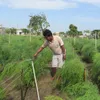Sapa to develop cold-water fish farming
Even in the domestic market, salmon raised in Sapa is facing severe competition from illegally imported salmon. There are currently 41 cold-water fish farming centres in Sapa.
Most of the fish are raised in artificial pools with water taken directly from local streams. A few salmon farms raise salmon directly in local streams, as in Ta Phin Village. In the streams, special fans with paddle propellers generate more oxygen in the water. Holes have been made in water pipelines to create trickles, another way to provide oxygen for the salmon. Salmon raised this way grow larger. However, there is the risk that a flash flood could destroy the entire salmon farm. Wastewater treatment is another important issue to avoid polluting other fish farms that share the same water sources.
Among all the challenges, Sapa has achieved one key success. From the 25,000 eggs imported from Finland in 2005, the Research Institute for Aquaculture No. 1 has been able to successfully breed and produce salmon. This centre is Viet Nam’s first cold-water hatchery and is currently home to nearly 30,000 salmon, including 17,000 mature fish raised from eggs. The success rate of raising fish from eggs is 95-97%.
"Each year the centre provides 50-60 thousand salmon roe to the local market. However, we are still unable to meet demand. Therefore, besides producing salmon roe locally, we still have to import eggs from Finland. Imported roe accounts for about one-third of total production" - said Le Ba Khanh, Technical staff, Research Institute for Aquaculture No. 1.
Fish feed is still 100% imported from Finland. Therefore, the centre is researching how to produce it locally to avoid dependence on imported products. Lao Cai Province has also identified branding as an important key task to promote salmon from Sapa.
"We are building a geographical indicator for salmon raised in Sapa. In the future, salmon products will be closely monitored from production to consumption. Salmon from Sapa will have its own brand name with a stamp and code for each batch" - said Vuong Tien Sy, Director of Lao Cai’s Agro-Forestry-Fisheries Quality Assurance Department.
The development model of cold-water fish farming helps to create jobs for people of ethnic backgrounds such as the H’mong and Dao groups, thus improving their living standard.
Tags:





